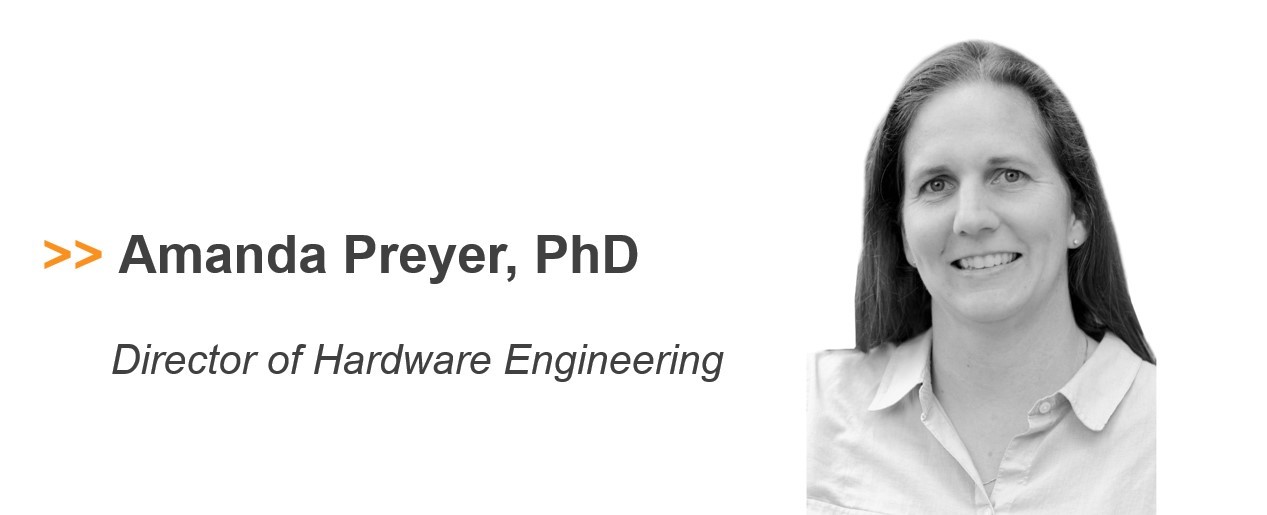
International Women in Engineering Day (INWED) is a worldwide awareness campaign designed to raise the profile of women in engineering, focus attention on the amazing career opportunities available to girls in this exciting industry, and celebrate the outstanding achievements of women engineers throughout the world.
In observance of this important day, the Axion team would like to recognize our very own Amanda Preyer, Director of Hardware Engineering for Axion. Amanda has been with Axion since the beginning, and over those 14 years has expanded her scientific expertise, project management skills, and leadership abilities as the company grew from a start-up with a bold vision to a global leader in next-generation in vitro live-cell analysis.
Can you share with us your journey in engineering and the projects you’ve worked on before and while at Axion?
I started this journey with a BS in electrical engineering from Lafayette College, followed by a job working for a small electronics consulting firm. Being with a small company allowed me to get a lot of firsthand experience with electronics and product design. In that role, I was able to work on a flow cytometer project for a larger life science company. This helped me realize there were places where I could combine electrical engineering skills with my love of biology. I left work to pursue a master’s degree at Georgia Tech, working with a professor in biomedical engineering. I graduated with my masters degree during a recession, so I stayed in school and completed a PhD in electrical engineering. While they were related, my master’s degree was focused on electronics design and my dissertation was in computational neuroscience. This gave me a unique combination of electronics design skills, neuroscience knowledge, and some real-world experience in designing and conducting research experiments. Which gave me the skill set I needed to join Axion’s electronics team.
In Axion’s early stages, I was able to be a part of all aspects of the product design. We started with some early proof of concept devices and turned those ideas into our first marketed product, the single-well Muse multielectrode array (MEA) system. As a small company just getting off the ground, we had to secure funding at several points along the way to advance our technology. To reach this goal, we applied for grants and created prototype devices to support our proposals. These resources allowed us to develop the Maestro MEA platform, which provided twelve times the capacity of a Muse. Over the next several years, we developed the Lumos optical stimulation device and the Maestro 2 as well.
One of the things I have most appreciated about working for a company like Axion is the variety of projects and challenges you can encounter. In addition to electronics design, I have been involved in grant writing, product design, consumable design, user guides, safety testing, and patent writing. In addition, some of my colleagues and I also pursued both Six Sigma Green Belt certification and Project Management certification. In the 14 years I’ve been at Axion, my electronics team has grown to three people. So, in addition to the hard skills I’ve learned here, I’ve added managing and project planning to my skill set.
What makes you passionate about engineering and technology in general?
I have always enjoyed designing things and solving puzzles. Whether it is thinking through how we can make the best tool for the job or solving a complex problem by breaking it down into the smallest pieces, the engineering mindset has always come naturally to me. I enjoy the opportunity to make things better or fix problems. I am especially motivated by the products we make at Axion. It is extremely rewarding to make products at the forefront of innovation that help advance our understanding of cell function and disease. It is easy to see how the impact of what I do on a day-to-day basis will eventually make an impact in a variety of medical fields.
What advice would you give to aspiring engineers?
My biggest piece of advice is to find the thing that’s going to make you want to get out of bed in the morning and go to work. I’ve learned that I love solving problems, but the application I work on and the people I work with are just as important to me. Work can be long and hard and there will be many problems that are challenging to solve. Find a team or a cause that makes it worth pushing through those times.